Rank Math + Elementor SEO: How I Rank Pages for Clients and Myself – 3 Pages (Real Case Study)
👋 Need help building or fixing an Elementor website?
I design fast, conversion-focused WordPress sites using Elementor.
Quick Note: This Rank Math Elementor SEO Case Study is optimized with Rank Math’s Content AI 😉
If you’re building with Elementor, you already know how easy it is to design beautiful websites.
But as someone who runs an design agency → 60pixel, I’ve learned the hard way that design alone doesn’t bring traffic. Clients don’t care how pretty a page looks if it doesn’t show up in Google.
That’s exactly where Rank Math SEO comes in. Over the past year, I’ve been using the Elementor + Rank Math combo not just for my clients, but for my own projects too.
And today, I'll share how you can turn things around using the Rank Math SEO Plugin – the exact tool that helped me rank some of my competitive blog posts built in Elementor.
No fluff, no theory; just real results and repeatable SEO steps.
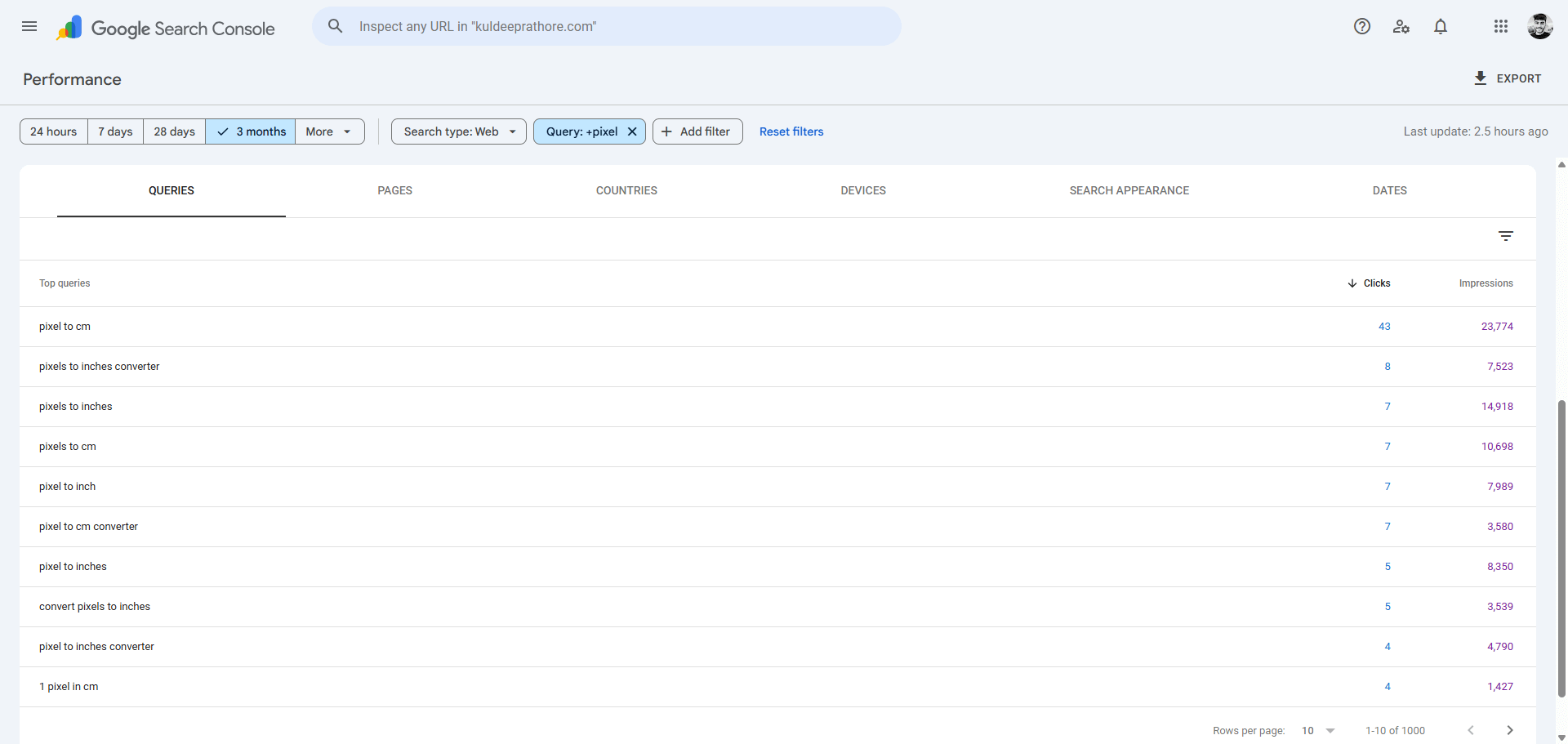
Let’s dive into my personal SEO story & I’ll also break down the exact steps I take to optimize every Elementor page using Rank Math PRO features (so you can replicate the process).
Here's a quick TOC for navigation…
Rank Math Optimized Pages That Are Now Ranking (And Why It Matters)
Let’s begin with some real data.
Here are three posts I created using Elementor and optimized using Rank Math:
- PX to CM Converter — Currently ranking #6 on Google for “px to cm converter.” Previously stuck on page 2 in a very competitive keyword space.
- PX to Inches Converter — Currently ranking in the top 10, gaining steady impressions for related long-tail keywords.
- The Plus Addons Discount Code — Holding position #2 and now featured in Google’s AI Overview, driving consistent, high-quality traffic.
Each of these pages serves a different purpose (tool, calculator, discount page), but they all share one thing in common: they’re fully optimized using Rank Math’s built-in features. And it works.
Here's a quick preview…
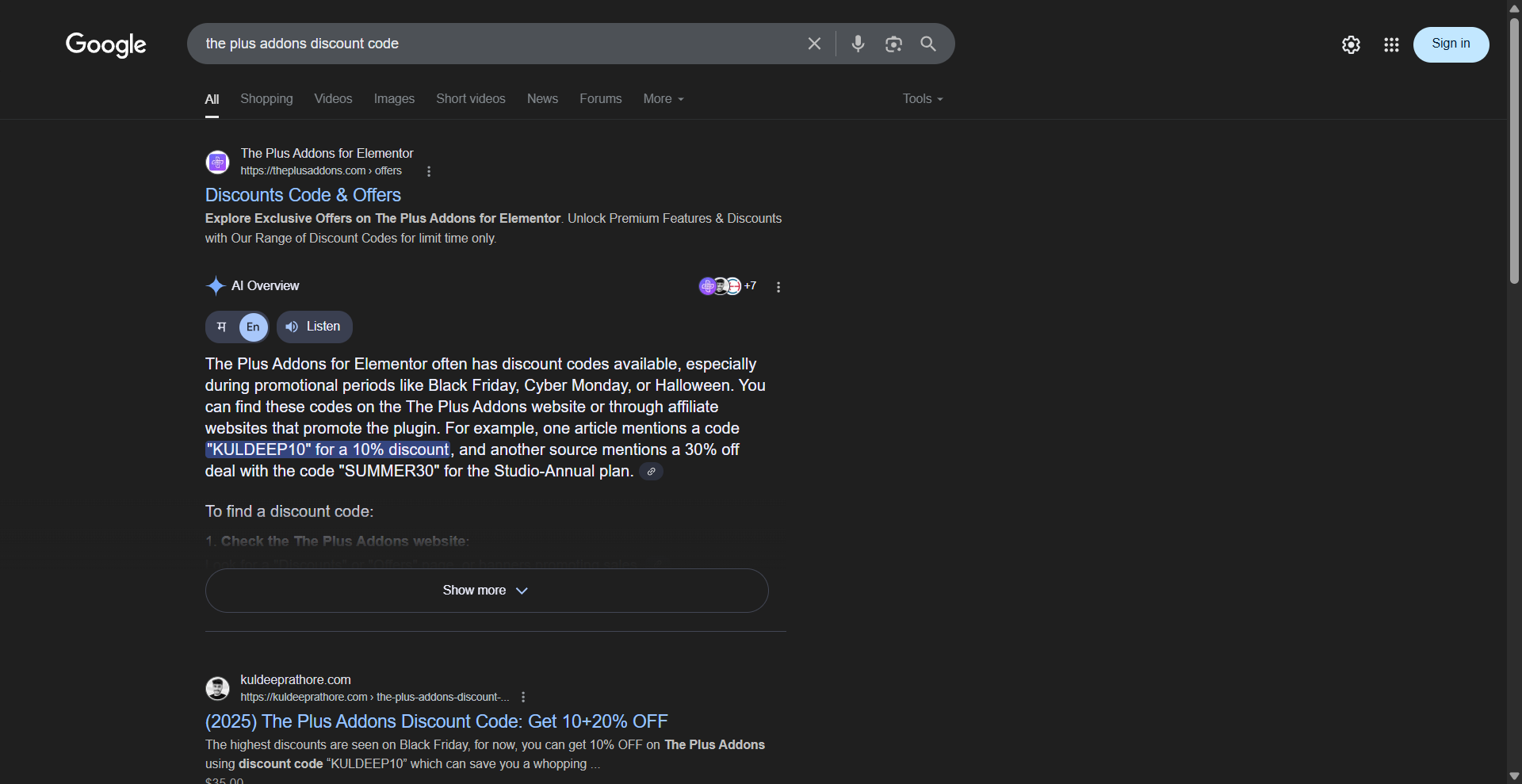
Now that you've seen the results, let me share why elementor needs it…
Why Elementor Needs Rank Math SEO?
Elementor is brilliant at design (it's my core page b but by default, it’s not SEO-friendly enough. I’ve seen this pattern with almost every client project:
- A gorgeous landing page… that takes forever to load.
- Fancy sections and animations… but missing headings, meta tags, and schema.
- Content that looks good to humans but is invisible to search engines.
When I take over such projects at 60Pixel, my first step is always to plug in Rank Math. It’s the fastest way to get control over meta titles, descriptions, schema, and performance tweaks without leaving Elementor.
And it’s not theory, I've shared how I used it myself.
My Performance Stack: Rank Math + Elementor SEO
My setup is intentionally lightweight.
I use the KadenceWP theme, design in Elementor Pro, and rely solely on Rank Math PRO for all SEO efforts.
Once Rank Math is installed, the Setup Wizard configures everything from meta data and XML sitemaps to schema defaults and Search Console integration.
But the real strength of Rank Math lies in its modular approach.
You can enable exactly what you need (nothing more, nothing less)
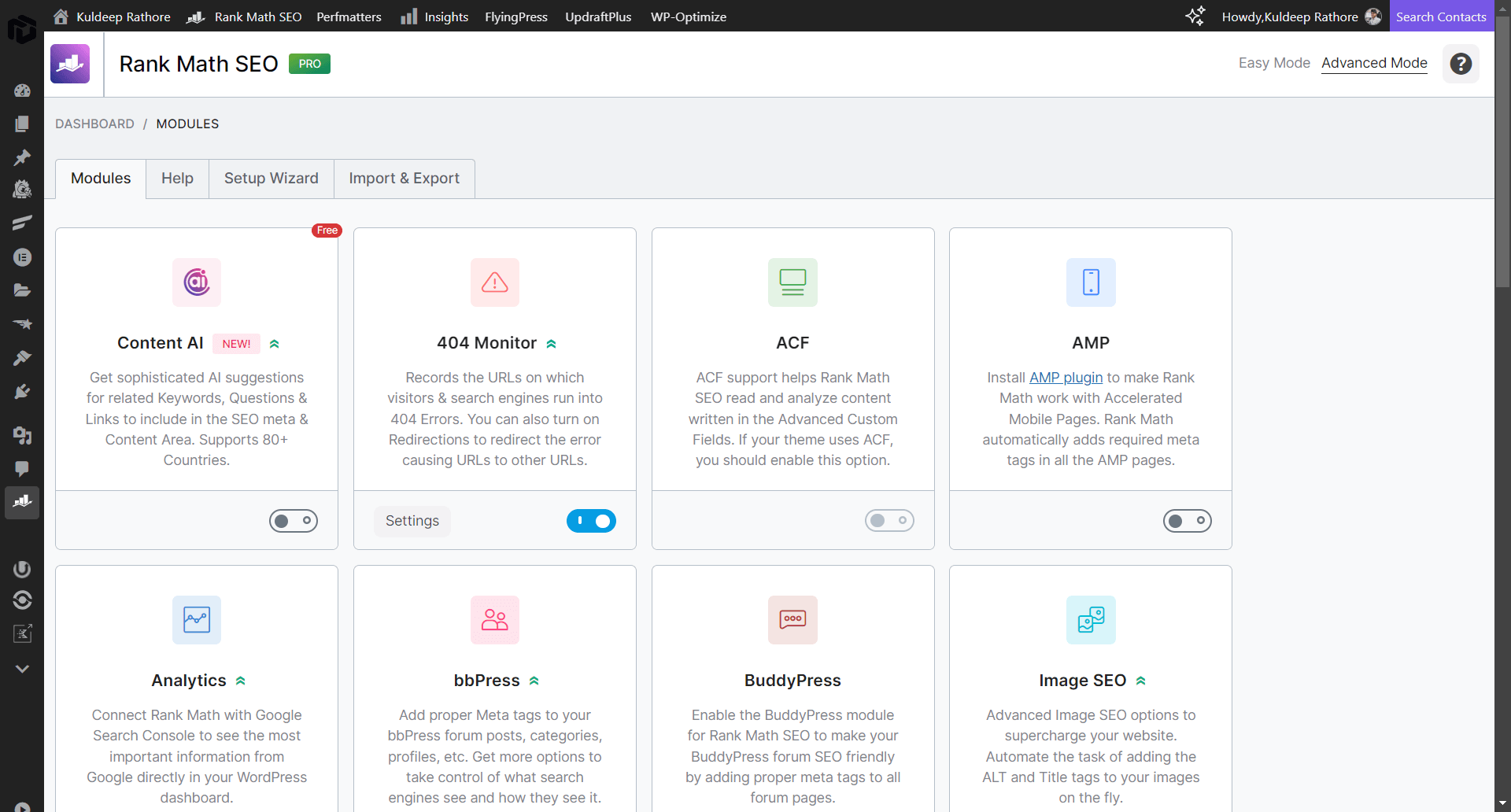
For all the pages mentioned above, I used the following Rank Math modules:
- SEO Analysis
- Schema Markup
- Content AI
- Instant Indexing
This modular approach is what makes Rank Math both powerful and beginner-friendly. You’re not overwhelmed, but you have depth when you need it.
On-Page SEO with Elementor + Rank Math Magic!
One of the key advantages of using Rank Math with Elementor is how seamlessly the SEO interface integrates into the builder. I don’t have to switch tabs or jump between backend and frontend views to optimize.
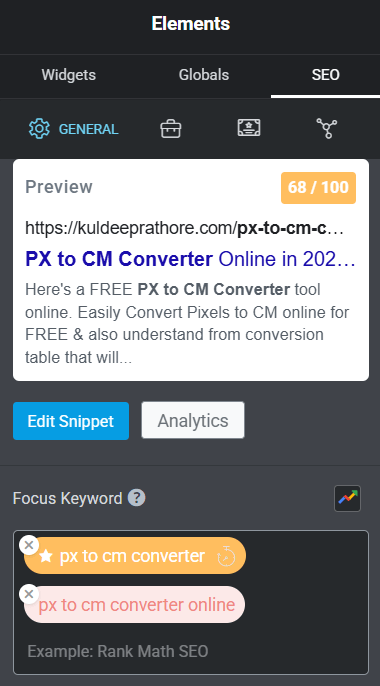
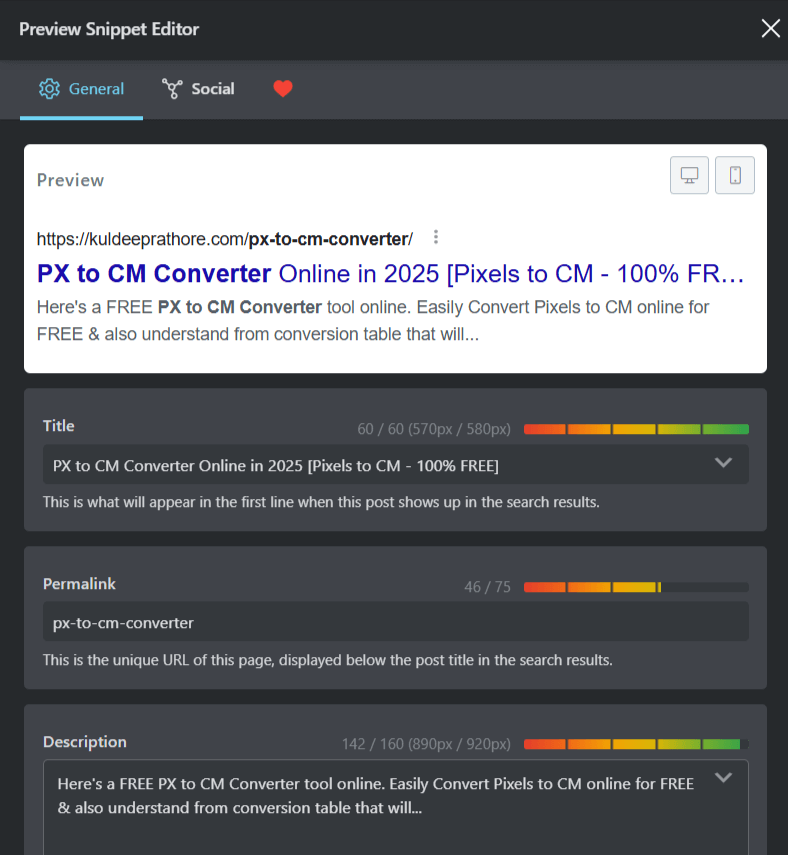
Inside the Elementor editor, I set my focus keyword, review the SEO score, and make real-time updates to:
- Title + meta description that make sense for humans
- URL slugs – short, clean slug
- H1 for the main topic, H2/H3 for supporting points
- Internal links to other strong pages
- Compressed images with descriptive alt tags
- Schema applied based on content type (Article, HowTo, Product).
For the “px to cm converter” page, I used this process to achieve an optimal SEO score before publishing.
Please Note: I don't obsess over scores (90+), the content just needs to be on-point & should fulfil user intent & the basic on-page SEO is good to go.
Rank Math's analysis helped me adjust the first paragraph for better keyword relevance, add internal links to related articles, and rephrase subheadings for clarity and impact.
Rank Math Advantage: Using Schema Without Touching Code!
Although I didn’t manually configure the schema on all my pages, Rank Math’s default schema automation ensured that the content was still eligible for enhanced SERP features.
For example:
- The calculator pages automatically picked up WebPage schema, giving Google clear context.
- The discount code page used Product Schema, which was auto-filled with brand name, pricing, and offer details (which you can manually set)
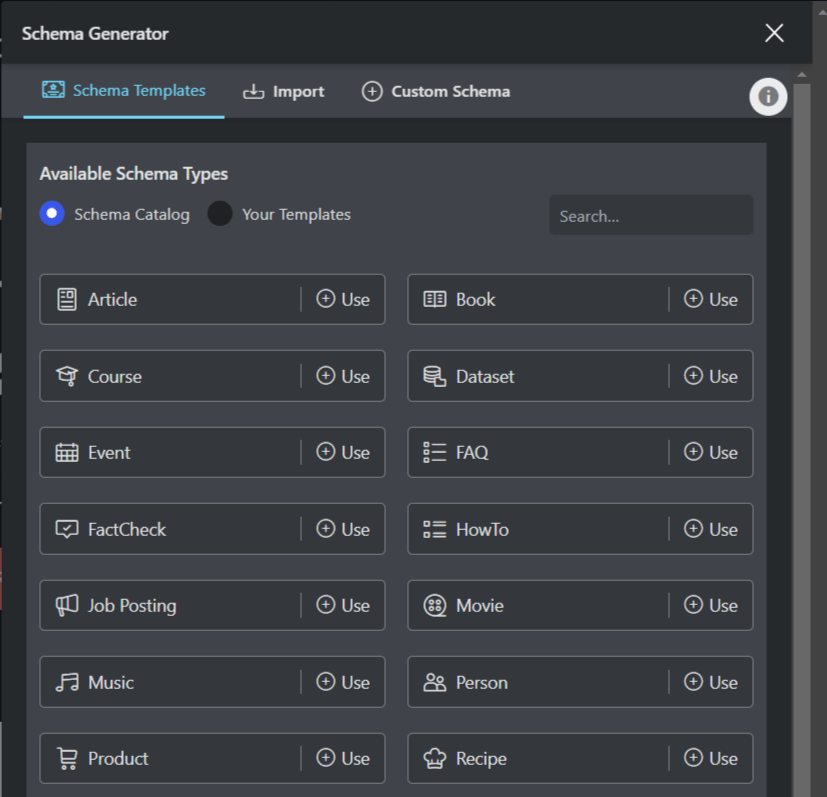
If you’re a marketer or designer (like me), who wants more control,
Rank Math’s Custom Schema Builder is incredibly intuitive.
You can visually construct FAQ, HowTo, Recipe, Product, or Event schema, and apply it to specific pages using conditions – this is gold.
And you know what, Schema has become more important than ever in the age of AI Overviews. Google’s new generative answers often pull content that is well-structured and semantically understood.
Rank Math helps you align with this direction.
How to Optimize Content with Rank Math Content AI?
One of the most underrated parts of Rank Math PRO is its Content AI feature that comes with 40+ AI Tools.
This tool analyzes your focus keyword and gives you a detailed breakdown of what your content needs to rank better (actually)
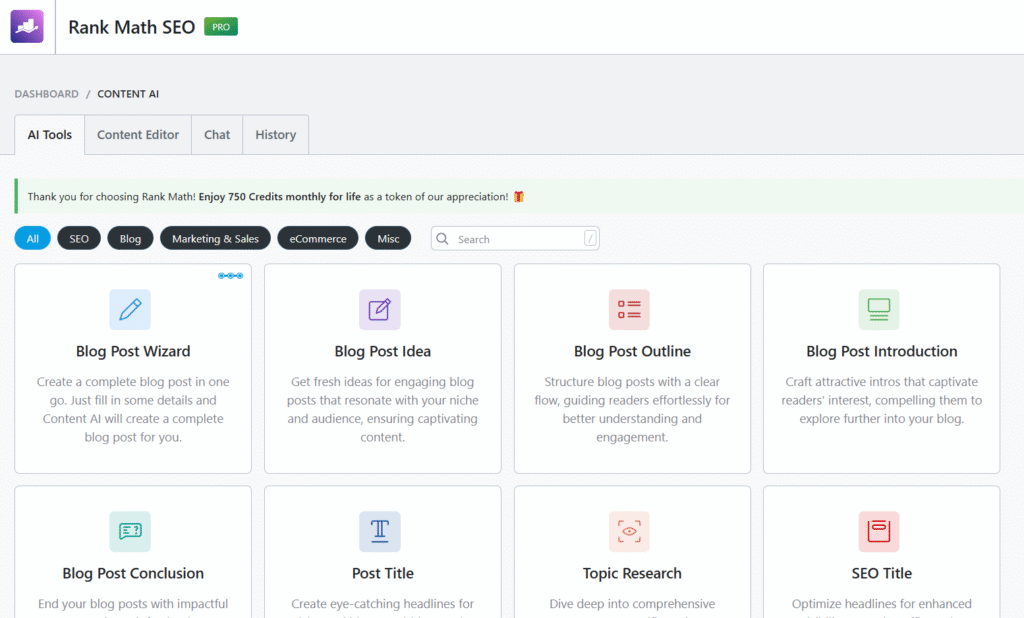
For each of the three pages, I ran Content AI & Rank Math's suggestions on:
- How many times to use the keyword and related terms
- How many external links, images, and questions to include
- What secondary keywords could support the main topic
This helped especially with the “px to inches converter” post.
By adjusting the body content and FAQs, I was able to match user search intent more closely & get more visibility in the SERPs.
Unlike other “content grading” tools, Content AI is lightweight, context-aware, and integrates directly into WordPress. You never leave your dashboard.
If you want to explore what's Rank Math Content AI can do,
here's My Honest Rank Math Content AI Review [Updated 2025]
Getting Indexed Faster with Instant Indexing
SEO isn’t just about optimization, it’s also about speed.
With Rank Math’s Instant Indexing feature, I was able to push all new content to Google within minutes of publishing.
This is especially powerful for:
- Time-sensitive content (e.g. discounts, announcements)
- Low-volume long-tail keywords
- New websites or blogs with less authority
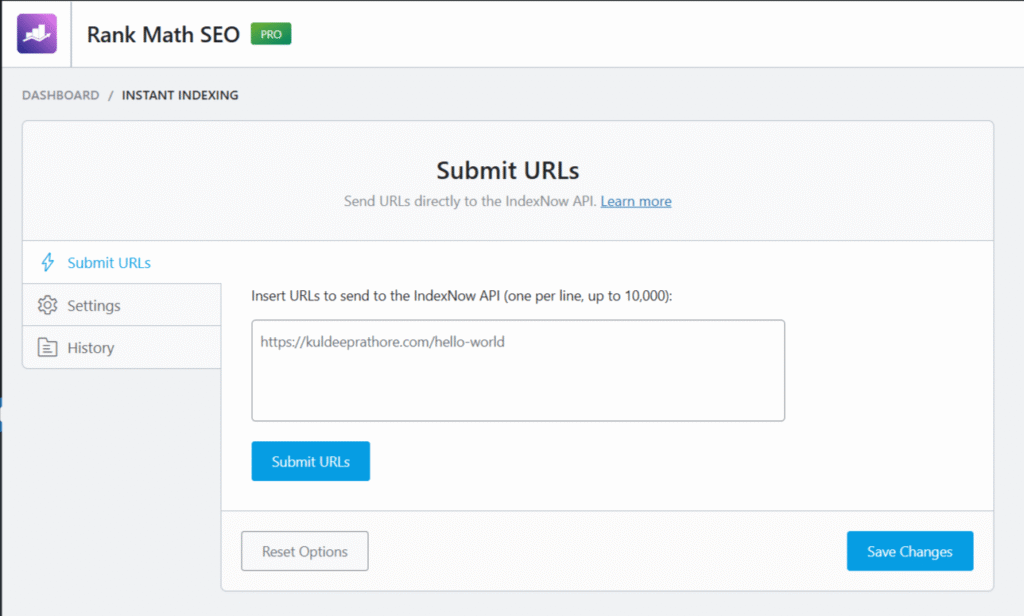
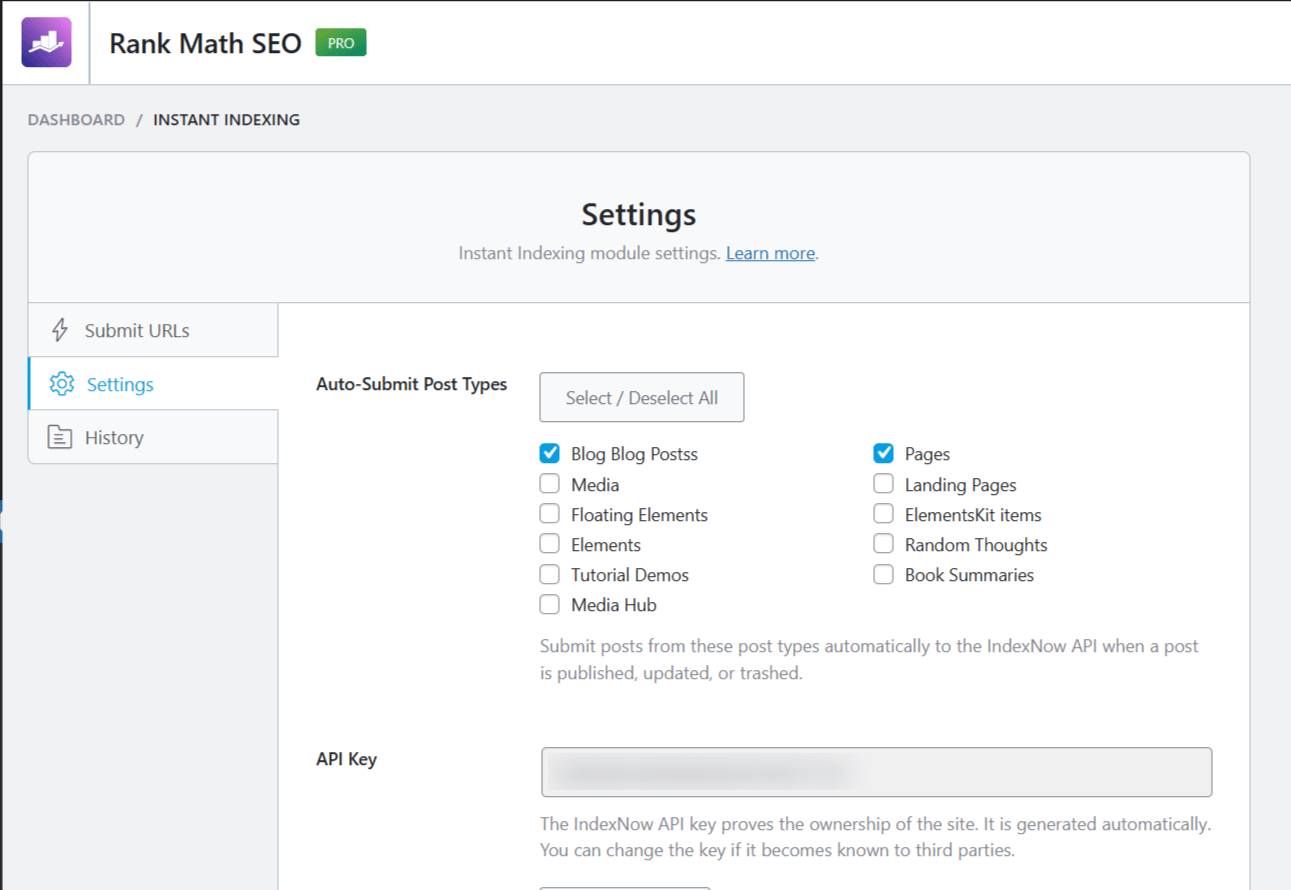
I used Instant Indexing immediately after publishing the PX to CM Converter post. Within 48 hours, it was not only indexed but started gaining impressions, eventually climbing to position 6.
Waiting days or weeks for Google to crawl your page is a thing of the past (Seriously).
Real Ranking Results After Using Rank Math

Let’s put some numbers to the process:
PX to CM Converter
- Target keyword: px to cm converter
- Before Rank Math: page was indexed but floating somewhere beyond page 2.
- After Optimization: applied focus keyword in Rank Math, wrote a proper meta title/description, compressed images, and set up schema.
- Result: currently ranking at #6 in Google.

The Plus Addons Discount Code
- Target keyword: the plus addons discount code
- Before Rank Math: page was hovering around page 3
- After Optimization: rewrote the copy around user intent (people searching for deals), added FAQ schema, improved meta tags, and internal links.
- Result: proudly sitting at #2 on Google
- Featured in: Google’s AI Overview (screenshot attached)
PX to Inches Converter
- Target Keyword: pixel to inches converter
- Before Rank Math: page wasn’t even stable in top 30 results.
- After Optimization: tweaked H1/H2 structure, added alt text, improved page speed with lazy loading, and set “HowTo” schema using Rank Math.
- Result: now consistently holding Top 10 positions.
This isn’t hypothetical SEO advice. It’s practical, tool-backed progress.
The Bigger Picture: How Rank Math Supports Elementor SEO
If you’re reading this, you’re probably already building pages with Elementor. You’ve got design flexibility, dynamic content widgets, and visual control.
But SEO is where many creators drop the ball.
Rank Math fills that gap.
It transforms on-page SEO from something technical into something systematic and repeatable. You don’t need to learn how to write schema code or analyze logs, you just follow the cues, watch your SEO score climb, and let Content AI do the heavy lifting.
For a deeper breakdown of Elementor SEO best practices, I’ve previously published a guide here:
👉 How to Do SEO for Your Elementor Website
That post explains broader strategy like
→ site structure, indexing logic, and mobile speed
whereas this guide focuses entirely on execution with Rank Math.
Real Quick: Why I Chose Rank Math Over Other SEO Plugins
I’ve used Yoast, All in One SEO, and SEOPress in the past. While they all offer the basics, I found Rank Math more aligned with how I work as an Elementor user.
- Yoast is solid but lacks deeper integrations and feels bloated at times.
- SEOPress is fast and flexible but lacks advanced schema and indexing tools.
- Rank Math offers a better UI, faster workflow, and game-changers like Content AI and Instant Indexing.
For someone optimizing dynamic, design-heavy pages, Rank Math gives more control without the friction.
5 SEO Lessons from 3 Years of Experience
After running this process dozens of times over the past 3 years, here are the takeaways that matter:
- SEO > Design: A simple but optimized Elementor page can outrank a fancy but bloated one.
- Rank Math inside Elementor saves time: No context switching; titles, schema, and previews are right there.
- Schema makes a difference: Even if FAQ rich results are limited now, proper schema still helps Google understand your content better – I've used the FAQ scheme in this post as well.
- Core Web Vitals are not optional: Elementor sites can be heavy — optimizing speed is part of SEO now.
- Iteration works: Don’t chase perfection on day one. Publish, then keep improving.
Final Thoughts: Why This Setup Works?
In my experience, Rank Math is one of those rare plugins that offers power without complexity. Unlike other tools, it doesn’t just scan your page for keywords.
It offers insight, automates smart tasks (like indexing and schema), and lets you build SEO momentum – without leaving your WordPress dashboard.
Combined with Elementor, it forms a complete publishing and optimization workflow that’s fast, flexible, and measurable – something what agency owners (like me) need.
You don’t need a big team. You don’t need to chase backlinks.
You need structure, consistency, and the right tools. Rank Math gives you all three.
If you're serious about getting your Elementor pages ranked – whether they’re calculators, blog posts, affiliate offers, or services – there’s no better combo than Rank Math + Elementor.
And as I’ve shown in my case study, it’s not just theory. It ranks.
So, Grab a license of Rank Math SEO plugin & start using these tips today,
and watch your SEO score, search visibility & traffic improve in no time.
1) Do I really need an SEO plugin like Rank Math if I’m already using Elementor?
Yes, because Elementor focuses on design, not SEO. Rank Math gives you control over titles, meta descriptions, schema, and keyword optimization – things Elementor alone doesn’t handle. Without it, your site might look great but struggle to rank.
2) Can I optimize my Elementor pages directly inside the editor with Rank Math?
Absolutely. Once you install RankMath, you’ll see a Rank Math tab inside Elementor. From there, you can add focus keywords, set titles, meta descriptions, and even schema without leaving the page builder.
3) What schema type should I use for my Elementor pages?
It depends on your content. For blog posts, use “Article.” For tutorials, “HowTo” works best. For service or product pages, pick “Product.” The goal is to help Google understand the type of content you’re publishing.
4) Will Rank Math help improve the speed of my Elementor site?
Indirectly, yes. Rank Math gives you insights into Core Web Vitals and page performance as well. But you’ll still need to optimize images, enable caching, and keep Elementor pages lean (I use FlyingPress to do so).
5) How do I know if my Rank Math + Elementor SEO setup is working?
Check two places: Rank Math Analytics (inside WordPress) and Google Search Console. You’ll start noticing higher rankings for focus keywords, better CTRs on your meta titles/descriptions, and more impressions if your setup is done right.

About the Author
Kuldeep Rathore is a WordPress & Elementor expert and co-founder of 60Pixel. With 3+ years of hands-on experience, he builds fast, SEO-optimized websites for creators and small businesses. Through this blog, he shares practical tutorials and tips trusted by the WordPress community worldwide.
